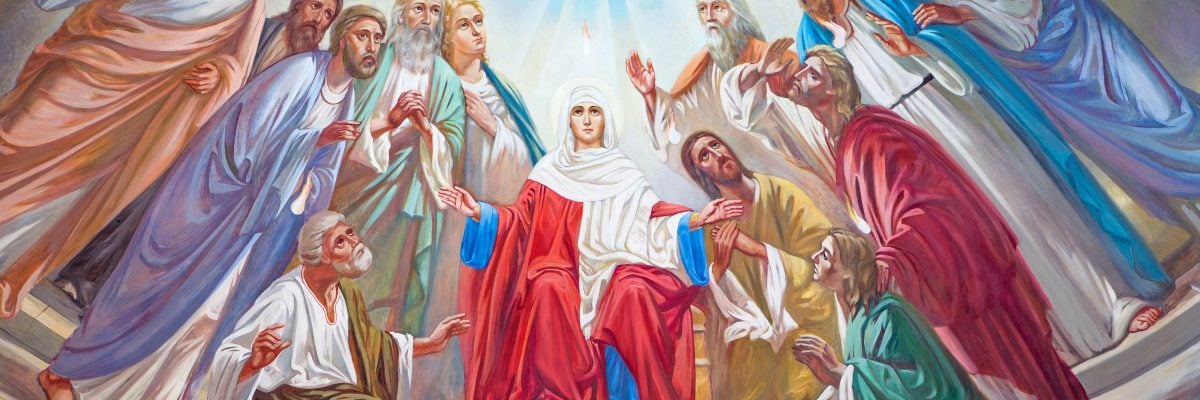
Homily for the Solemnity of Pentecost, 2018
Tu septiformis munere, donum Dei altissimi!
“You who are sevenfold in your gifts, yourself the gift of God most high!”
Just as God the Son is named the Word of the Father, so too the Holy Spirit has some names most proper to him among the persons of the Most Holy Trinity. His name is Love and his name is Gift.
Now it is perhaps easy for us Christians to have an intuitive grasp that God the Holy Spirit is love. After all, “God is love” as St. John tells us. In God, the Holy Spirit is the substantial love of the Father and the Son, a distinct person in the Godhead, sometimes called the “kiss” or the “embrace” of the Father and the Son. This is of course a love that is coeternal and coequal with the Father and the Son. The Holy Spirit is just as infinite, uncreated, and all powerful as those divine persons from whom he proceeds as from one source. With them “he is adored and glorified.” There is nothing that one person has that the other does not have, except the personal identity. The Holy Spirit who is love is not less than the Father and the Son, just as the Son in his divine nature is not less than the Father, nor is the Father diminished by generating the Son and breathing out the Holy Spirit.
All of this may seem to be very beautiful and mysterious and perhaps a bit abstract, until we consider what the result of being love in person is. No other being is love in person. Only the Holy Spirit is substantial, personal love, identical with love itself. The result of being the original, first, and personal love of God is that the Holy Spirit is also the Gift of God; he is Gift par excellence. But since another person does not come forth from him, how does his being Gift express itself?
The Word is the expression of the Father, the Holy Spirit is the love of the Father and the Son. But how does the Holy Spirit show himself as Gift? After all, what can he give to the Father and the Son, who are already infinitely perfect and in need of nothing, whose happiness and power and unity cannot be increased or improved? What could he give to the persons who have everything, indeed to the Father who is the “giver of every good gift,” or to the Son who has everything from the Father?
Perhaps the truest answer to this question would be to say that we have here a mystery beyond our comprehension, and we simply do not know. But there is something of an answer, and a very powerful and consoling one for us, given in Sacred Scripture and the teaching of St. Thomas Aquinas in his Summa.
Recall that in the account of the creation of the world in Genesis, the Holy Spirit of God is said to be “brooding” over the waters of chaos, of nothingness, ready to bring about creation at the Word of God. In Scripture, the Holy Spirit is closely related with God’s word of creation, in making it perfect, in bringing it to completion. The entrance antiphon or introit for the Mass of Pentecost tells us that “the Spirit of the Lord fills the whole earth.”
Now, the pinnacle of creation according to Genesis is human nature, man and woman created in God’s image. And so our nature is the work of the Gift-Spirit filling the earth most of all. Now let us hear Our Lord’s amazing words from John’s Gospel in the seventeenth chapter. He addresses his eternal Father:
“I in them and you in me, that they may be brought to perfection as one, that the world may know that you sent me, and that you loved them even as you loved me. Father, they are your gift to me. I wish that where I am they also may be with me, that they may see my glory that you gave me, because you loved me before the foundation of the world.”
Within the inner life of the Holy Trinity, the Son could say of the Holy Spirit, “Father, he is your gift to me,” for the Holy Spirit is the Love, the Gift of the Father and the Son. But here the Savior calls us the Father’s gift. Yet we know that our creation is brought to completion by this same Holy Spirit.
In a very real sense, the purest, merest gift is something that the one to whom we give it does not need. If he were to need it, it would be something owed in justice or charity. We know that the Father and the Son have no need of anything, and surely they have no need of anything created! So what purely gratuitous, “extra” delightful present could there be to give the Son? Something he would love but doesn’t need, namely creation, and as its summary and perfection, human beings, the elect, those he loves so much that he takes on their own nature and becomes himself the Spirit’s Gift both to us and to his Father “who for us men and our salvation, came down from heaven and was incarnate by the Holy Spirit of the Virgin Mary and became Man.”
Blessed John Henry Newman calls this “a greater gift than grace.”
Because our own human lives, lived in the grace of the “Creator Spirit” who comes today, are a gift of the Father to the Son, this gives us a great and consoling security. For a gift, by definition, is never taken back and does not ask for a return. Let’s hear St. Thomas from his Summa, in the context in which he discusses the Holy Spirit as Gift:
In proof of this (namely, that “Gift” is the personal name of the Holy Spirit) we must know that a gift is properly an unreturnable giving, as Aristotle says (Topic. iv, 4)—i.e. a thing which is not given with the intention of a return—and it thus contains the idea of a gratuitous donation. Now, the reason of donation being gratuitous is love… Hence it is manifest that love has the nature of a first gift, through which all free gifts are given. So since the Holy Ghost proceeds as love, He proceeds as the first gift. Hence Augustine says: “By the gift, which is the Holy Ghost, many particular gifts are portioned out to the members of Christ” (I, Q38, A2).
How confident we should be, in spite of our many failings, of the Father’s desire to save us! If he has given you and me as gifts to his Son, he surely does not intend to take us back, nor does the Son “return” us once we have been given to him. In the end, in the glory of heaven we will see how mysteriously our lives were united to the Holy Spirit as the eternal Gift of the Father and the Son. This is beyond our comprehension, but it is a great assurance in times of discouragement, and a motive for the deepest gratitude: “Blessed be the Holy Spirit, the consoler!”



